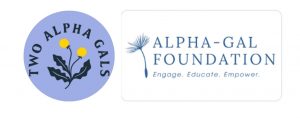Have you heard of Alpha-gal Syndrome (AGS)? This tick-borne allergy is spreading far beyond its Southeastern roots, and Debbie Nichols, co-founder of Two Alpha Gals knows its challenges firsthand. After more than a decade chasing answers to mystifying health woes, her diagnosis ignited a mission to help others navigate AGS without sacrificing joy. As she reminds us, “…in the midst of a serious health challenge, there’s room for reinvention, connection, and hope.”
By Guest Author: Debbie Nichols, Two Alpha Gals
“Joy is an act of resistance”
—Sojourner Truth
The Quest for Answers
Candice Matthis and I met almost 8 years ago at a mutual friend’s birthday party and shortly after, our new friendship began.
Both of us had been battling frustrating and debilitating health challenges since 2007. On our separate health journeys, it took each of us over ten years to be diagnosed with alpha-gal syndrome (AGS).
Commonly called ‘Red Meat Allergy’, AGS is so much more than that. Yes, it’s definitely an allergy to red meat (beef, lamb, pork, etc.), but it can also include red meat by-products like dairy and gelatin. It’s devilishly hard to tie a reaction back to a food consumed since symptoms often don’t strike for many hours after eating.
AGS is caused by a tick bite, primarily from a Lone Star tick, but it can be hard to connect the dots back to a bite. Candice distinctly remembers getting bitten by a tick on her toe when she was nine months pregnant. Me? It’s a complete mystery, though I do live on a farm and spend a lot of time outdoors, hiking and tending to my beloved four-legged friends. Ticks are sneaky arachnids!
For years I bounced back and forth between my primary care provider and a legion of specialists. It was a blur of feeling unwell and chasing ‘experts’ for answers. Some doctors were so dismissive of my symptoms, which often didn’t present during exams, it made me question my mental health.
You see, AGS symptoms can gaslight you. Seemingly random at times, they can mimic symptoms of a wide range of other chronic conditions like IBS, heart conditions, chronic fatigue syndrome, fibromyalgia, and arthritis. At one point, my stomach pains, nausea, and vomiting were so intense and unrelenting, I had my gallbladder removed, following my GI specialist’s recommendation. With no relief. I also swam through life in a perpetual brain fog. Once I had to stop the car and pause to remember my street number so I could grab my mail. I was deeply afraid I was facing early onset dementia.
Without relief or definitive answers from specialists, I took matters into my own hands and cut gluten out of my diet. Although it helped me feel a little better, it was hard. Candice consoled me, showing me that I didn’t also have to give up the joy I found in the kitchen. She taught me: Reframe my perspective. Modify. Cook. Bake. Twirl.
Candice was finally diagnosed with AGS in 2019 after a period of acute illness. After discovering Candice and I had experienced eerily similar symptoms over the years, I also (finally!) got tested for AGS. I suspected beef was a culprit, but I needed to know for sure. Surprise, surprise — the test came back positive!
When the doctor handed me my alpha-gal diagnosis and advised me to avoid beef, there was a period of relief knowing what was wrong and that there was something I could do about it. But the relief was soon replaced by feeling like the rug was pulled out from under me.
And the news kept getting worse. Just avoiding a juicy hamburger for dinner might not be enough to safeguard you from an allergic reaction. Mammalian by-products hide in personal care products, vitamins and supplements, cereal, white sugar, maple syrup, chewing gum, alcohol, laundry detergent, even toilet paper. You need to know the origins of ingredients that you can barely pronounce, let alone spell, like carrageenan and butyl stearate, among others. The lack of transparency in labeling makes identifying mammal-derived ingredients in consumer foods and products a practically impossible challenge.
Alpha-gal symptoms can even be triggered by inhaling the allergen. Just passing a restaurant cooking beef or pork, being close to someone wearing perfume with mammal-derived ingredients, or even driving past a dead skunk in the road can cause a fume reaction for some people with AGS.
Giving up so many of the foods I love was daunting. But I held onto what Candice had taught me: Reframe my perspective. Modify. Cook. Bake. And twirl. Especially, twirl.
Where Twirling Led
Over the past decade, Candice and I have watched alpha-gal syndrome evolve from a medical curiosity to a growing public health concern. In a 2023 study, the CDC estimated suspected cases at 110,000 in the U.S. between 2010 and 2022, but this number may exceed 450,000 due to lack of information, awareness, and under-diagnosis. Though the absolute number of cases may seem small, the growth has been explosive. While the Southeast is ‘ground zero’ for AGS, it’s spreading north and to the Midwest as the lone star tick pushes geographic boundaries, fueled by climate change and a growing deer population. It’s only going to become more widespread.
As we dove deeper into the complexities of AGS, we realized how little information there was for navigating everyday life.
And so, Two Alpha Gals began.
We started sharing about our experiences and all that we had learned to move from survival to joy. We shared practical tips to help close the knowledge gap for others with AGS and created a resource of accurate, trusted information. Our goal was (and still is) to show others that resilience and reinvention without sacrificing joy are possible!
Partnering with Candice as one half of the alpha-gal duo, has filled these past six years with purpose, joy, and gratitude.
- We’ve been able to connect with leading AGS experts and share their knowledge with followers on our YouTube video series.
- We launched our easy-to-understand 101 resource guides that help our community build their AGS toolkit, identify sneaky sources of alpha-gal, and empower self-advocacy.
- We host an original podcast — In the Tall Grass — and have meaningful conversations with some of the most incredible humans!
- And we get to work one-on-one with our mentorship clients (who inspire us daily), meeting them where they are and helping them create a customized GPS to navigate their life.
Ultimately, we have been given the greatest gift of all — community!
When You’re Equipped You’re Resilient
AGS can feel unpredictable, but preparation is a powerful antidote. We’ve learned that when you understand your body, your tools, and your support system, the overwhelm quiets and confidence grows. Being prepared doesn’t remove the challenges, but it does help you meet them from steadier footing, a place of calm.
Consider these tips your point of departure — practical steps to help you stay grounded and resilient, no matter what AGS throws your way.
- If you suspect alpha-gal, ask your provider for a blood test.
- Know your symptoms and have a plan to get help to treat them, if needed.
- Become familiar with your epinephrine device: practice using it, keep it within reach, and carry two at all times.
- Build a support team who can help you through the aftermath of an exposure.
- Stay strong mentally and tend to your mental health — AGS-life exacts a heavy mental toll.
- Practice speaking up about your needs and get comfortable asking for help from others.

In the end, our journeys with alpha-gal syndrome have taught Candice and me that knowledge is power, community is medicine, and joy is a form of resilience. What began as two women searching for answers has grown into a mission to empower others with the tools, resources, and confidence to navigate life with AGS. By reframing, modifying — and yes, always twirling — we’ve discovered that even in the midst of challenge, there’s room for reinvention, connection, and hope. And if our story reminds you of anything, let it be this: you are not alone, and with the right support, you can find your way to joy, too.
In 2024, Candice and I took a big step and launched the Alpha-Gal Foundation to bridge the gap between healthcare and human care, making life simpler for the thousands grappling with a life-altering alpha-gal diagnosis
After five years working as Two Alpha Gals, we felt it was time to broaden our reach and expand the work we started as Two Alpha Gals. The foundation gives us a bigger voice and provides access to more resources to drive change for our AGS community.
Our mission is to:
- Engage communities in conversations around AGS issues and priorities.
- Educate individuals impacted by AGS, healthcare providers, and the public on AGS.
- Empower those living with AGS to navigate their lives with confidence and joy.
Our goal is to make alpha-gal Top Allergen #10 in the U.S., and we need our community’s full support to make that happen. If you’d like to support our bill, here’s a link to request support from your representative. The road is long, but the destination will be worth the journey.
We’re beyond excited to meet the unmet needs of the growing AGS patient population. If you would like to support the work of the Alpha Gal Foundation please visit us here.

About the Author: I live on a small farm in Virginia with my husband, my two kids, plus my other ‘kids’ that include sheep and other much loved four-legged friends. I’m passionate about simplifying life for others with AGS so they can live with more joy and less struggle. When I’m not working, you can probably find me chasing down my kids, hiking or paddle boarding, dabbling in writing, or, in a rare moment, settled in with a good book (and maybe a gin & tonic?) Don’t miss our Two Alpha Gals podcast, ‘In the Tall Grass’, and follow us on Instagram, Facebook, and YouTube.
Images: Courtesy of Two Alpha Gals
Resources for Alpha-Gal Allergy
- NIH Prevalence Estimates
- 2023 CDC Study on Prevalence
- VCU Health Prevalence Estimate
- Basic sources of alpha-gal sugar
- Two Alpha Gals: Free Alpha-Gal Basics Guide
- Two Alpha Gals: Alpha-Gal 101 Resource Guide
- Alpha-Gal Foundation Guide: Kitchen
- Two Alpha Gals: Food Allergy Mentorship
- Article on first Alpha-Gal Syndrome-linked fatality



